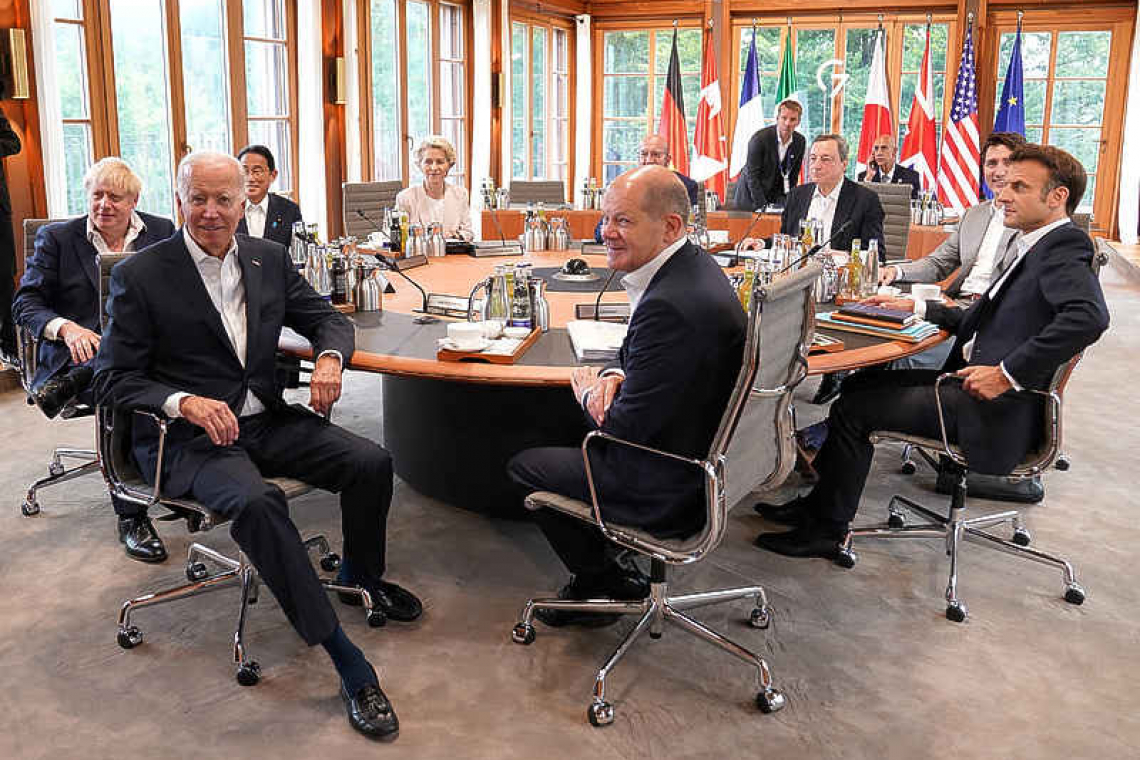Britain's Prime Minister Boris Johnson, Japan's Prime Minister Fumio Kishida, U.S. President Joe Biden, Germany's Chancellor Olaf Scholz, European Commission President Ursula von der Leyen, France's President Emmanuel Macron, Canadian Prime Minister Justin Trudeau and Italy's Prime Minister Mario Draghi attend a meeting alongside the G7 leaders summit at Bavaria's Schloss Elmau, near Garmisch-Partenkirchen, Germany on Tuesday.
SCHLOSS ELMAU, Germany--The Group of Seven economic powers have agreed to explore imposing a ban on transporting Russian oil that has been sold above a certain price, they said on Tuesday, aiming to deplete Moscow's war chest.
The war in Ukraine and its dramatic economic fallout, in particular soaring food and energy inflation, dominated this year's summit of the group of rich democracies at a castle resort in the Bavarian Alps. An oil price cap would ratchet up existing Western pressure on Russia from sanctions, which German Chancellor Olaf Scholz insisted would stay until Russian President Vladimir Putin accepted failure in Ukraine.
"There is only one way out: for Putin to accept that his plans in Ukraine will not succeed," Scholz told a closing news conference at the end of the three-day G7 summit he hosted.
The idea behind the cap is to tie financial services, insurance and the shipping of oil cargoes to a price ceiling. A shipper or an importer could only get these if they committed to a set maximum price for Russian oil.
"We invite all like-minded countries to consider joining us in our actions," the G7 leaders said in their communique.
The G7 is looking at the price ceiling as a way to prevent Moscow profiting from its invasion of Ukraine, which has sharply raised energy prices, taking the sting out of Western efforts to curb imports of Russian oil and gas. Russian oil export revenues climbed in May even as volumes fell, the International Energy Agency said in its June monthly report.
The G7 was also exploring the possibility of a gas price cap, a move pushed especially by Italy, G7 officials said. France meanwhile has called for price caps on all energy sales.
Experts warn the plan could backfire. Tamas Varga from oil broker PVM said Putin, for example, could decide to reduce energy exports in retaliation, which would stoke prices. Some countries like China could also find workarounds.
The Kremlin said on Tuesday Russian gas giant Gazprom could seek changes to its delivery contracts if the West implemented a price cap.
The war, which has killed thousands and displaced millions, has entered its fifth month with no signs of abating. Firefighters and soldiers searched on Tuesday for survivors in the rubble of a shopping mall in central Ukraine struck by a Russian missile.
The G7 leaders, who later headed to Madrid for a summit of the western NATO alliance, condemned the attack as a war crime. "Putin and those responsible will be held to account," they said in a statement.
G7 leaders urged China in their communique to uphold the principle of peaceful settlement of disputes by pressing Russia to stop its invasion of Ukraine and dropping its "expansive maritime claims" in the South China Sea. NATO is set to cite China as a concern for the first time in its strategy concept, according to diplomats.
G7 nations want to crank up pressure on Russia without stoking already soaring inflation that is causing strains at home and savaging developing nations. There is a "real risk" of multiple famines this year as the Ukraine war has compounded the negative impact of climate crises and the COVID-19 pandemic on food security, United Nations chief Antonio Guterres said last week.
In their statement, G7 leaders pledged $4.5 billion on Tuesday to fight global hunger, but activists panned the sum as far too low. The United Nations World Food Programme says it needs $22.2 billion this year.
"Faced with the worst hunger crisis in a generation, the G7 have simply failed to take the action that is needed," said Max Lawson, Head of Inequality Policy at Oxfam. "Many millions will face terrible hunger and starvation as a result.”







